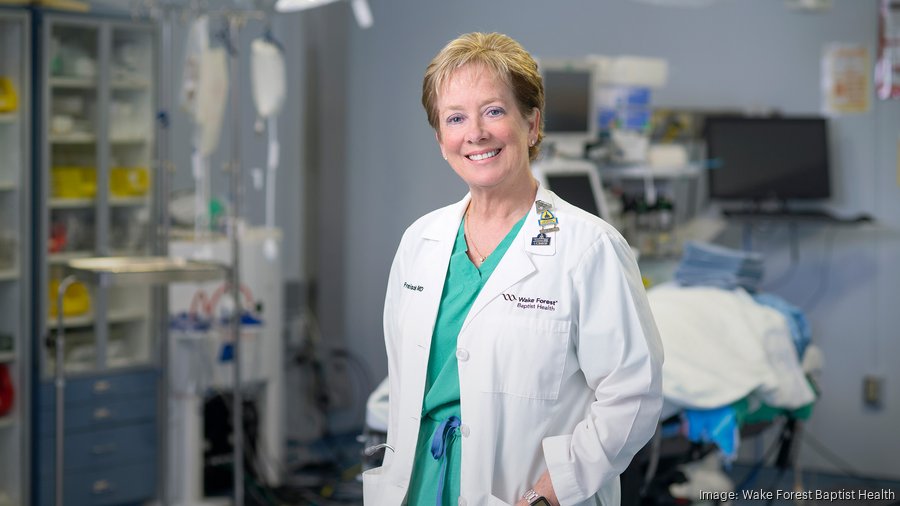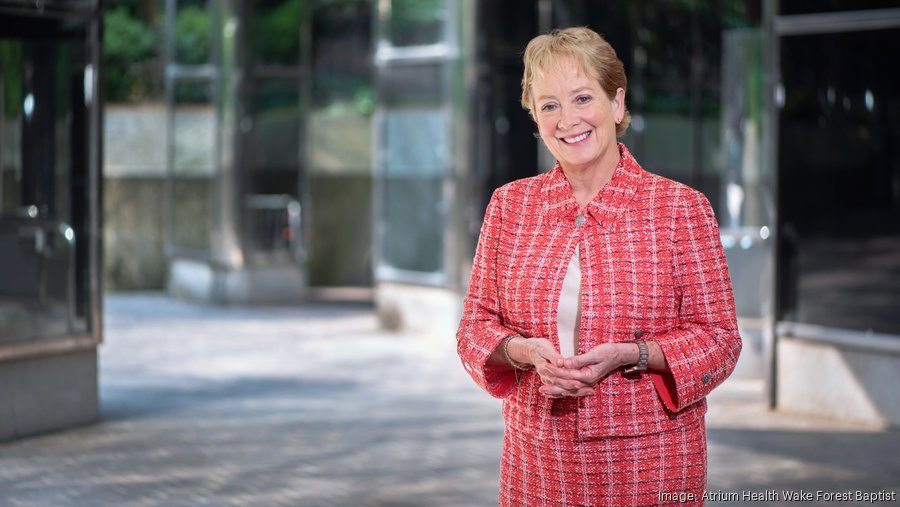Listen to this article 3 min
Just because she took one set of responsibilities off her plate doesn’t mean Dr. Julie Ann Freischlag is slowing down.
In January, Freischlag stepped down after five years as dean of Wake Forest University School of Medicine, with Dr. Ebony Boulware taking over.
She still leads Atrium Health Wake Forest Baptist as CEO and serves as chief academic officer at the newly formed Advocate Health — the result of a merger between Advocate Aurora and Atrium Health in late 2022.
Those roles still make for a full plate. Freischlag is overseeing the expansion of AHWFB’s flagship Winston-Salem hospital, having broken ground on a new $450 million critical care tower last fall and working on plans to build an eye institute in Innovation Quarter and a $30 million outpatient center at Brenner’s Children’s Hospital.
AHWFB is set to serve as the exclusive health-care partner for Metropolitan Village, a new mixed-use development project in east Winston-Salem.
Freischlag will still also have a large hand in medical education as chief academic officer for Advocate Health. She’ll be overseeing residency programs and academic research activities across the South and Midwest, including the expansion of the Wake Forest medical school into Charlotte with its partnership with Atrium Health.
“The biggest power here is not only to teach and train the next generation but also to take some of our clinical trials across this big footprint and make a difference in patients’ lives,” Freischlag said.
On top of it all, Freischlag still has time to step into the classroom as a professor and into the operating room as a vascular surgeon with a recognized talent for treating thoracic outlet syndrome.
Triad Business Journal recently sat down with Freischlag to learn more about her new roles, what the merger between Advocate Aurora and Atrium Health means and who she relies on to help get things done. The following conversation has been edited for clarity and brevity.
Now that you are no longer serving as dean of the Wake Forest University School of Medicine, tell me how your other roles are refocusing.
Before, in my role as chief academic officer (for Atrium), I was overseeing our medical school, the physician assistant school, the nurse anesthetist school, the Cabarrus College of Health Sciences and the Carolinas College of Health Sciences. Now, we have multiple residency programs in hospitals in the Chicago and Milwaukee areas. As the chief academic officer (for Advocate), my role will be to try to put together all the residency programs in Milwaukee; Chicago, Macon, Georgia; Charlotte; and here. I’ll still be the CEO of (AHWFB), a $4.5 billion system with five hospitals. I still am an executive vice president of health affairs for Wake Forest University, working with president Susan Wente to look at the university’s role in how we go forward with all of this. The role (as dean) got bigger and bigger and bigger. I must admit, I didn’t realize how busy it was getting. Now, we have two of us. Dr. Boulware is amazing and has great ideas about where we can go with the school and with research.
How will you unite all those residency programs?
We just created a team that will have me as the CAO and includes Dr. Boulware as the chief science officer. We have people, called the designated institutional official, who oversee the residents: Dr. Thomas Hansen in the Chicago-Milwaukee area and Dr. Mary Hall out of Charlotte. They oversee the residencies as well as teaching and training. Dr. Boulware will represent the medical students. Also on that team will be Dr. Kevin High, who is presently president (of AHWFB). We’re recruiting for a new president, so he’ll help us get clinical trials across the whole system. Then, Terry Hales, who had been helping me run the medical school, will be the executive vice chief academic officer. Dr. Chris O’Byrne (current vice dean and vice president for administration at the medical school) will help Dr. Boulware. We’ve got a great team. Once we visit everywhere, we’ll be looking at where some residencies can be added or grown and how we can exchange some of the residents between institutions.
What do you mean when you say adding residencies?
Many of those hospitals in Chicago and Milwaukee have not had a strong affiliation with any medical school in the past. Some medical schools have sent some of their residents to these hospitals, so they haven’t developed their own residency yet, but some have. A couple of them want to develop residencies now. It’s an evolution going from being a site where other medical schools would send residents to being a site where you have your own residents.
How do you envision your relationship with Dr. Boulware?
She’ll take us to the next level with research access, health equity and a new campus. She’ll report to me as the dean, but I’m here to support her, her new ideas and what she wants to do as we grow the second campus in Charlotte and as we expand our research footprint. As chief science officer of Advocate Health, she’ll help us look at clinical trials and the things we should and could be doing throughout the whole system. We’re excited she’s here. Her attention to the students and research is great.
You’ve mentioned expanding clinical trials across the Advocate Health system. Why is that important?
What we’ll be able to do with this big footprint — about 7 to 8 million patients — is we can do our clinical trials not only in Charlotte and in Winston-Salem but also in Chicago and Milwaukee. We’ll be to deliver clinical trial opportunities to a wide range of patients, no matter where they seek care. We’ll be able to try new therapies across the system and even new deliveries of care. Since we have so many sites to do that, the impact will be greater.
There’s still plenty for you to oversee here in the Triad as the head of Atrium Health Wake Forest Baptist. Tell us about some of what’s happening.
I’m looking out my window at the ground as they’re building up the critical care tower. They’re making really good progress. It’ll be another two years before it’s ready. Hopefully the adult emergency room will be ready first. We’ve been waiting for a new emergency room for about 25 years, I think. We’re also now in the final stages of deciding what the Eye Institute that will be downtown will look like. Some of the inflation and related activity have made us relook at exactly where it should be and how much it’s going to cost. We’re almost done looking at that. Then, we have ability to put in some pediatric clinics; we’re thinking about location and haven’t quite decided whether we need one site for or multiple sites because it’s so nice if it’s closer to where the patients live.
With the partnership with the now-expanded Advocate Health, do you think anything will change locally or regionally?
I think what (the partnership is) going to do is to help the names of Wake Forest University School of Medicine and Atrium Health Wake Forest Baptist be nationally known. We’re now part of the fifth-largest health system. The impact will allow us to get more people asking us to do clinical trials and asking to come work for us and train with us as residents.
Even without the deanship, it seems like you’ve still got a full plate, and I know you still teach and perform surgery regularly. How do you handle it?
You must be very organized and have great teams. For me, keeping real — doing surgery, going to clinic, doing research — makes me feel that I understand what my teams are going through. Covid-19 has been so hard, and coming out of Covid-19, we’re busy as can be and expenses are high at all hospitals, with staffing and inflation. It also makes me remember why I do this, why I am a doctor. Plus, it gives me joy. I still love teaching residents and fellows and students. That next generation to me is just so important.

